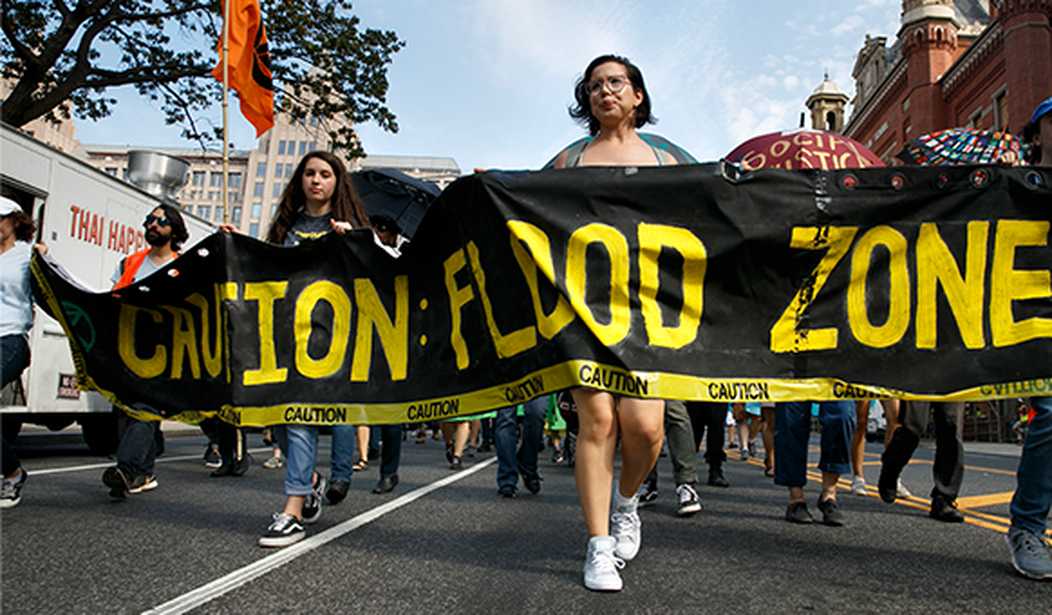It's great to see someone take a hard look at data - facts - and not only realize, but openly admit, "I was wrong." Many people are just incapable of admitting when they're wrong - not me, mind you, if I'm ever wrong about anything, well, when that day comes, I'll be the first to admit it. But science is, or should be, driven by data, and so should public policy and the discourse that goes around it.
The climate issue has yielded a few such people. The latest may be one Ted Nordhaus, who documented his "Road to Damascus" moment in a lengthy article here.
He begins:
Recently, in an exchange on X, my former colleague Tyler Norris observed that over the years, my views about climate risk have evolved substantially. Norris posted a screenshot of a page from the book Break Through, where Michael Shellenberger and I argued that if the world kept burning fossil fuels at current rates, catastrophe was virtually assured:
Over the next 50 years, if we continue to burn as much coal and oil as we’ve been burning, the heating of the earth will cause the sea levels to rise and the Amazon to collapse, and, according to scenarios commissioned by the Pentagon, will trigger a series of wars over the basic resources like food and water.
Norris is right. I no longer believe this hyperbole. Yes, the world will continue to warm as long as we keep burning fossil fuels. And sea levels will rise. About 9 inches over the last century, perhaps another 2 or 3 feet over the course of the rest of this century. But the rest of it? Not so much.
Facts are stubborn things. Yes, the world will continue to warm regardless of what we do; we are in an interglacial period. And humans, we should note, are adapted for warm, not cold weather; we'll be fine, as the risks to humans from the climate are decreasing, not increasing.
Despite close to a degree and a half of warming over the last century or so, global mortality from climate and weather extremes has fallen by a factor of 25 or more on a per capita basis. As (Roger) Pielke documented recently, the world is on track this year for what is almost certainly the lowest level of climate related mortality in recorded human history, not only on a per capita basis but on an absolute basis as well. The economic costs of climate extremes continue to rise, but this is almost entirely due to affluence, population growth, and the migration of global populations towards climate hazards, mainly cities that tend to be located in coastal regions and flood plains.
The risk of a changing climate, as the data clearly shows, does not warrant drastic and dramatic change to our high-energy, high-tech, comfortably modern lifestyles. That's the primary epiphany that Ted Nordhaus seems to have had.
Of course, those of us who question this issue of anthropogenic climate change are accustomed to having the climate scolds hurl the epithet "climate change denier" at us. Now, I will only speak for myself here, but I've never denied that the planet's climate changes over time. Nor have I ever denied that human activity has an effect, although I do question the scold's claims as to the extent of that effect and, as noted above, the risks to our lifestyles of that effect. The evidence is plain from multiple sources; through most of Earth's history, it's been warmer than it is now. In fact, through much of the planet's history, humans would have had difficulty surviving. In the Carboniferous, CO2 and O2 levels were much higher, resulting in the planet's being a steam-bath, with pole-to-pole tropical jungles and dragonflies the size of eagles. The reverse is true as well; fond as I am of the original "Jurassic Park," one of the first scenes in that film shows sauropod dinosaurs feasting on eucalyptus trees, which are toxic; even today, almost nothing save koalas can eat them.
But the time scales involved in these changes are hard for us to fathom.
Read More: Smug 'Doom Pixie' Greta Thunberg Prepping 'Selfie Yacht 2.0'
Latest Associated Press Silly Shamefest: Your Dog Is Causing Climate Change
Our planet moves on its own time scales, and the various cycles are measured in geologic time, not human time; millions, not hundreds, of years. Mr. Nordhaus points out that even the reduced warming trends he accepts will have little impact on human activity for hundreds or thousands of years, in which time we will have means of dealing with these changes that we can't imagine now; imagine a brilliant scientist from the 1700s coming somehow into today's world and trying to comprehend our modern technologies, and now imagine going forward 250 year and experiencing a like displacement.
We solve today's problems with tomorrow's technology. If any such threat to humanity surfaces, in a hundred years or a thousand, assuming we are still around, we will develop the technologies to deal with them. The facts and the risk assessments simply do not justify radical action now that would degrade our modern lifestyles - action that includes, among other things, replacing reliable, cheap energy sources with expensive, intermittent, unreliable ones. And we should strive to carry this issue; we do, after all, have the facts, the data, on our side.















